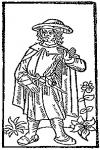Biography
Francois Montcorbier (Villon) was born in 1431 to a poor young couple in Paris. Villon's father died when the poet was very young and Guillaume de Villon, a well to do chaplain who was a professor of ecclesiastical law at the University of Paris, took Villon in. His academic success allowed Villon to enter the university and obtain both a bachelor (1449) and masters degree (1452), though he seemed to spend more time enjoying the liberal freedoms that students were allowed at the time.
Possibly because of poverty, Villon seemed to be drawn toward the sordid element - thieves, defrocked priests and revolutionary student groups. Villon found them in the seedy taverns where he frequently caroused. He engaged in a short romantic affair with a young lady and later received a humiliating thrashing because of it. Villon became bitter toward the rich and was driven deeper into his involvement with the criminal contingent. In June 1455 Villon fatally wounded a priest who had entered a tavern denying God and began quarreling with Villon and his drinking companions. Villon was banished from Paris for the crime. Villon was allowed to return to Paris in 1456 after being pardoned for the killing on grounds of self defense.
The next year Villon was banished again for stealing from the College of Navarre with his criminal compatriots who had formed Coquille, something akin to a small Mafia. Before fleeing Paris, Villon wrote The Legacy, a tongue in cheek poem bequeathing his real and imaginary wealth to various 'deserving' people and institutions. The Coquille conducted a crime spree throughout the north of France, robbing mainly churches and clergy, including Villon's own wealthy uncle. At the same time, Villon continued writing poetry that became popular among his criminal friends because of its use of their lingo and its attacks on many well known people and institutions. However, the authorities began arresting and hanging many of his gang so, in 1457, Villon sought refuge with the Duke of Orleans, a fellow poet and admirer of Villon's work. Villon was again sent to prison for theft, but he was quickly pardoned on the occasion of the birth of the Duke's daughter several months later. From this point, Villon lived a vagabond existence of petty theft while wandering through the pleasant French countryside.
He returned to his benefactor the Duke in 1861. As usual, his freedom did not last long. He was imprisoned for a minor crime and yet again pardoned a few months later when the newly crowned King passed through the town where he was imprisoned. Villon returned to Paris where he was arrested several more times for theft and brawling, but was soon released by virtue of some fortunate circumstance. His luck finally ran out when he was arrested for fighting and sentenced to the gallows. While awaiting the noose, Villon composed a brilliant poem about his own execution and the injustice of man. However, a last minute appeal to Parliament got his sentenced reduced to 10 years banishment from Paris in 1863. He was never heard from again. He was 34 years old. His poetry continued to gain popularity in Paris and throughout France where it went into seven printings.
Between times in prison he produced volumes of what are still considered by many to be the finest French lyric verse ever written. His poem, Le Petit Testament (The Small Testament), known also as Le Lais (The Legacy), was composed about 1455, and Villon's other long poem, Le Grand Testament (The Large Testament), known also simply as Le Testament, soon followed.
The "Testaments" are mock or imaginary wills in which bequests are made alternately with compassion and with irony. For example, to the Holy Trinity, Villon leaves his soul; to the earth, his body; to a Parisian, Denis, some stolen wine; to a madman, his glasses; to a lover, all the women he wants. At least two of Villon's shorter poems - Ballad of Hanged Men and I Am Francois, They Have Caught Me - were composed in 1462 while under sentance of death.
Some of Villon's poetry was translated into English by Dante Gabriel Rossetti, Algernon Swinburne, and, in the 20th century, Ezra Pound. Francois Villon did not leave a large literary legacy (only about 3300 lines).






